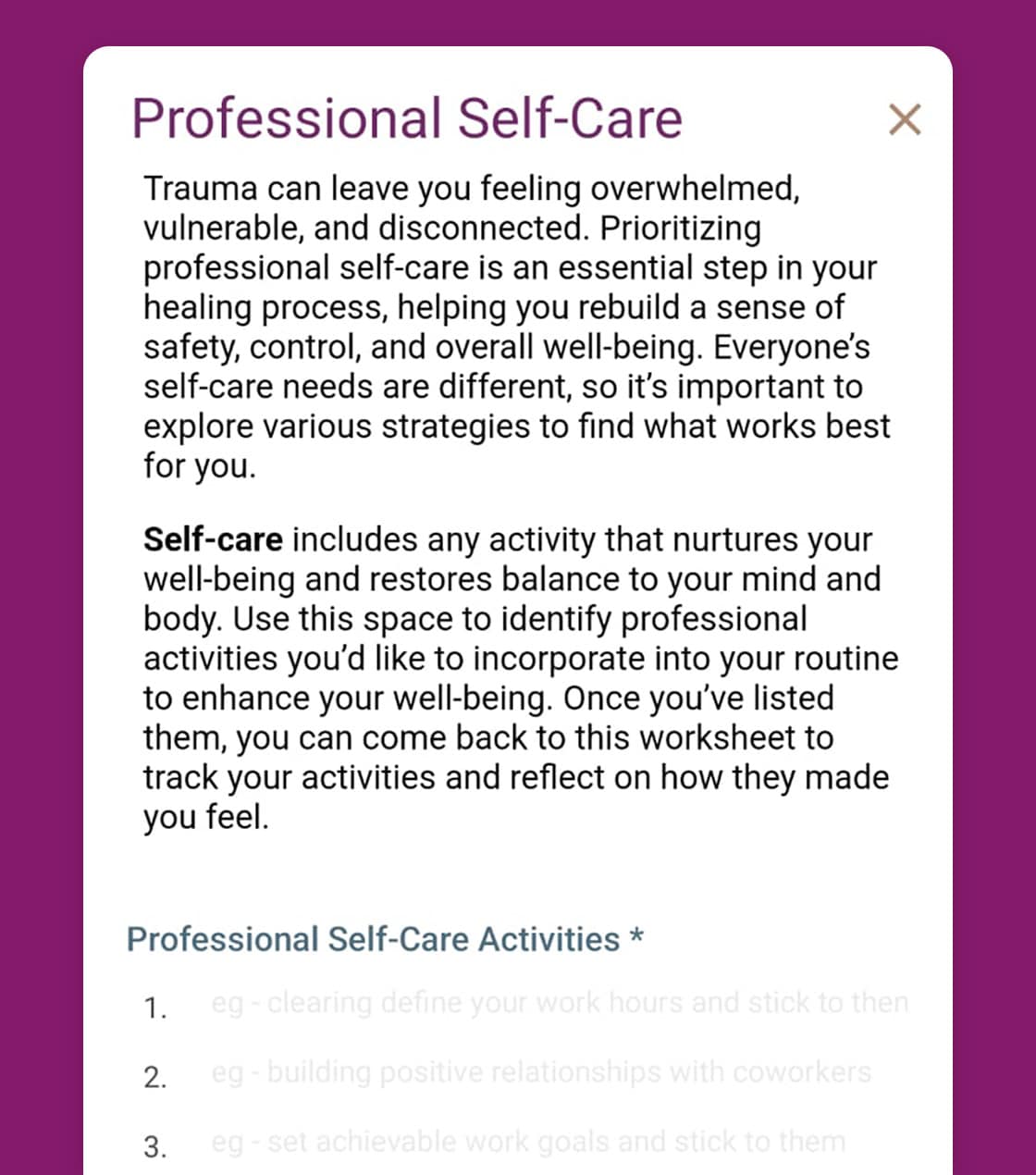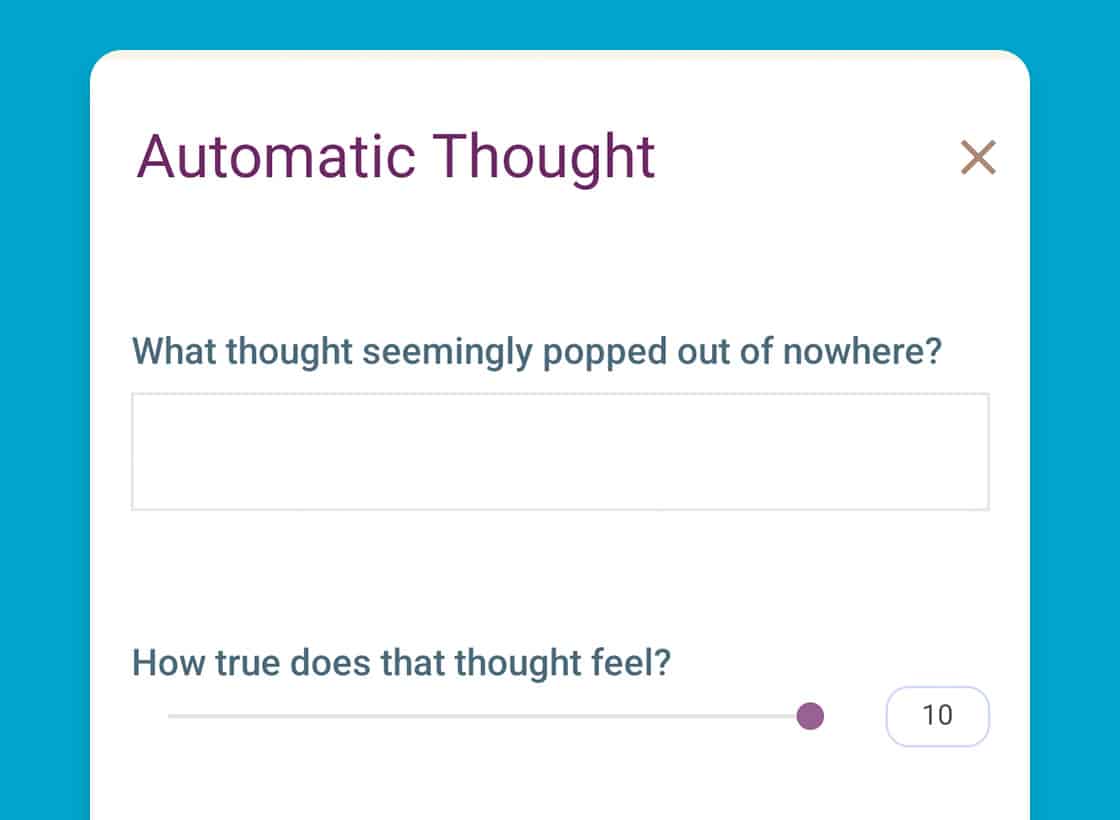Professional Self-Care
Template by Reflective
Best for OCD Anxiety Depression PTSD CBT ACT Trauma En Eating Solution Focused
The Professional Self-Care assignment helps clients prioritize activities that support balance, fulfillment, and well-being in their professional life, including maintaining healthy boundaries where needed. Stress and trauma can make it difficult to engage in fulfilling work or sustain positive habits, but this tool offers a simple and structured approach. Clients identify professional self-care activities they want to focus on and track how they feel before and after engaging in them. Suitable for modalities like Trauma-Focused Therapy, Cognitive Behavioral Therapy (CBT), and Acceptance and Commitment Therapy (ACT), this assignment encourages resilience, reduces burnout, and fosters a more meaningful and sustainable connection to work.
Share the Professional Self-Care exercise with your client
Share the Professional Self-Care worksheet with your patient with the Reflective app so they can do the work between sessions. Simply enter their email, and they’ll be able to fill in the worksheet from the convenience of their phone. Get started for free!
How does Reflective work?
Share exercise with client via Reflective
Client receives email with app link and connection request
Client clicks link to download app
Client accepts your connection and exercises you shared
Client uses app to fill in exercises, gets reminders
Table of Contents
- Introduction
- A Brief History of Behavioral Activation
- Behavioral Activation in Various Therapeutic Frameworks
- How Behavioral Activation Supports Professional Self-Care
- Integrating Professional Self-Care into Practice
- Using Reflective to Support Professional Self-Care
- Reframing Work Through Professional Self-Care
Professional Self-Care and Behavioral Activation
Introduction
Behavioral Activation (BA) is a therapeutic intervention that helps clients engage in meaningful activities to improve their mental health. While it is often associated with treating depression, its applications extend to many facets of personal and professional life. One particularly impactful area is professional self-care, which involves setting healthy boundaries at work and fostering a more fulfilling and sustainable career.
For therapists and their clients alike, the workplace can be both a source of stress and an opportunity for growth. This article will explore Behavioral Activation’s history, its role in therapeutic frameworks, and how integrating professional self-care can help clients—and therapists—redefine their relationship with work. Reflective, a client engagement platform, can be a valuable ally in helping clients implement these strategies.
A Brief History of Behavioral Activation
Behavioral Activation originated in the 1970s as a component of Cognitive Behavioral Therapy (CBT). Initially developed to address depression, its core focus was to disrupt avoidance patterns and encourage re-engagement in rewarding activities. The simplicity of BA—helping individuals align their actions with meaningful goals—quickly demonstrated effectiveness as a standalone intervention.
In 1996, Jacobson et al. validated BA’s efficacy in treating depression independently of other CBT components. Since then, it has become a widely used evidence-based approach for a variety of mental health challenges.
For deeper insights into the evolution of BA, Behavioral Activation: Distinctive Features by Jonathan W. Kanter, Andrew M. Busch, and Laura C. Rusch is an excellent resource.
Behavioral Activation in Various Therapeutic Frameworks
BA’s flexibility makes it compatible with many therapeutic modalities, including:
- Acceptance and Commitment Therapy (ACT): Encourages clients to pursue values-driven actions while accepting discomfort.
- Dialectical Behavior Therapy (DBT): Integrates BA principles to help clients build meaningful lives through mastery and engagement.
- Trauma-Focused Therapy: For individuals processing trauma, BA provides a structured approach to rebuilding routines, while professional self-care strategies can help establish safety and predictability in work settings.
Integrating BA with these approaches helps therapists address both behavioral and workplace challenges, offering clients a pathway to healthier professional lives.
How Behavioral Activation Supports Professional Self-Care
Professional self-care involves creating and maintaining boundaries, cultivating work-life balance, and finding meaning in one’s career. Behavioral Activation provides a framework for identifying avoidance patterns and replacing them with intentional, value-driven behaviors that support professional fulfillment.
Key Strategies for Professional Self-Care:
- Boundary Setting: Help clients identify areas where they overextend themselves and practice saying “no” to tasks that conflict with their priorities.
- Balancing Effort with Reward: Encourage clients to incorporate activities that replenish their energy, such as breaks, social connection, or professional development.
- Aligning Work with Values: Guide clients to reflect on what truly matters to them in their career and take steps toward greater alignment.
Integrating Professional Self-Care into Practice
Behavioral Activation can be seamlessly adapted to address professional challenges. Here’s a practical approach:
- Identify Workplace Avoidance Patterns: Use Reflective’s tools to help clients pinpoint situations they avoid at work, such as difficult conversations or taking breaks.
- Set Actionable Goals: Collaboratively design a plan that includes specific, values-driven actions to foster a healthier work environment.
- Utilize Reflective for Follow-Through: The platform allows therapists to send reminders, track progress, and provide psychoeducation on professional self-care.
- Evaluate and Adjust: Continuously review what strategies are working for the client. Reflective’s data insights can guide necessary changes to the plan.
Using Reflective to Support Professional Self-Care
Reflective offers specialized exercises designed to help clients build healthier professional habits. These tools include:
- Boundary Tracking: Clients can log instances where they set or struggled to maintain boundaries, helping them recognize patterns over time.
- Stress and Recovery Logs: Reflective enables clients to document how they feel before and after implementing professional self-care strategies, providing real-time feedback.
- Access to Educational Resources: The platform offers psychoeducation on topics such as work-life balance, managing burnout, and assertive communication, which can complement therapy sessions.
These features empower clients to take ownership of their professional well-being while allowing therapists to monitor and support their progress effectively.
Reframing Work-Life Through Professional Self-Care
When clients integrate professional self-care into their routines, work can become a source of fulfillment rather than stress. Setting boundaries and aligning actions with values not only improves mental health but also enhances productivity and satisfaction. Behavioral Activation provides the tools to identify what matters most and take meaningful steps toward a more rewarding professional life.
Reflective can amplify these efforts by offering a structured way to track progress, reinforce goals, and access supportive resources. Therapists who prioritize professional self-care in their practice can foster more sustainable and impactful careers for themselves and their clients.



